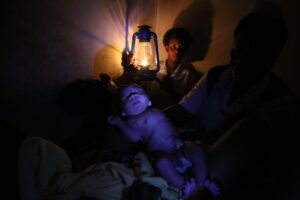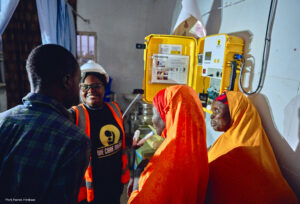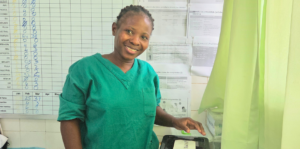 Ninety percent of health centers in Liberia are without electricity. And without a national electricity grid, these centers have little hope of obtaining power for light and other electricity needs. World Health Organization is studying the relationship between energy poverty and health outcomes, and is eager to see the impact of bringing electricity to small clinics in regions like Liberia. This Spring, WE CARE Solar is partnering with WHO and the Liberian Institute of Biomedical Research to bring WE CARE Solar suitcases to 18 health facilities. Over the next year, the clinical outcomes of these clinics will be compared to 18 similar clinics that have no electricity. We’ve redesigned our suitcases and lights for our Liberian project, and we are hoping to raise enough funds to provide solar suitcases to ALL of the clinics in the study, including those clinics serving as “controls” during this year. WE CARE Solar will be conducting a solar electricity training in Liberia in March, and our team will then supervise the installations of our easy-to-use systems. Liberian physician Raj Panjabi, Director of Tiyatien Health, was kind enough to visit us in Berkeley this week to provide us with much needed information about the physical structure and needs of the Liberian clinics. We need to plan for placement of solar panels on corrugated metal rooftops, and in preparation have transformed our workshop to match the conditions we expect to find in Liberia. And we’re hoping that our first stop in Liberia won’t be our last. We will be discussing ways to bring light to Tiyatien Health clinics in the future.
Ninety percent of health centers in Liberia are without electricity. And without a national electricity grid, these centers have little hope of obtaining power for light and other electricity needs. World Health Organization is studying the relationship between energy poverty and health outcomes, and is eager to see the impact of bringing electricity to small clinics in regions like Liberia. This Spring, WE CARE Solar is partnering with WHO and the Liberian Institute of Biomedical Research to bring WE CARE Solar suitcases to 18 health facilities. Over the next year, the clinical outcomes of these clinics will be compared to 18 similar clinics that have no electricity. We’ve redesigned our suitcases and lights for our Liberian project, and we are hoping to raise enough funds to provide solar suitcases to ALL of the clinics in the study, including those clinics serving as “controls” during this year. WE CARE Solar will be conducting a solar electricity training in Liberia in March, and our team will then supervise the installations of our easy-to-use systems. Liberian physician Raj Panjabi, Director of Tiyatien Health, was kind enough to visit us in Berkeley this week to provide us with much needed information about the physical structure and needs of the Liberian clinics. We need to plan for placement of solar panels on corrugated metal rooftops, and in preparation have transformed our workshop to match the conditions we expect to find in Liberia. And we’re hoping that our first stop in Liberia won’t be our last. We will be discussing ways to bring light to Tiyatien Health clinics in the future.

Dr. Laura Stachel Receives AFSIA Lifetime Achievement Award: Full Acceptance Speech
Thank you for this extraordinary honor. To receive a lifetime achievement award from the African Solar Industry Association is deeply meaningful to me. My work—and






